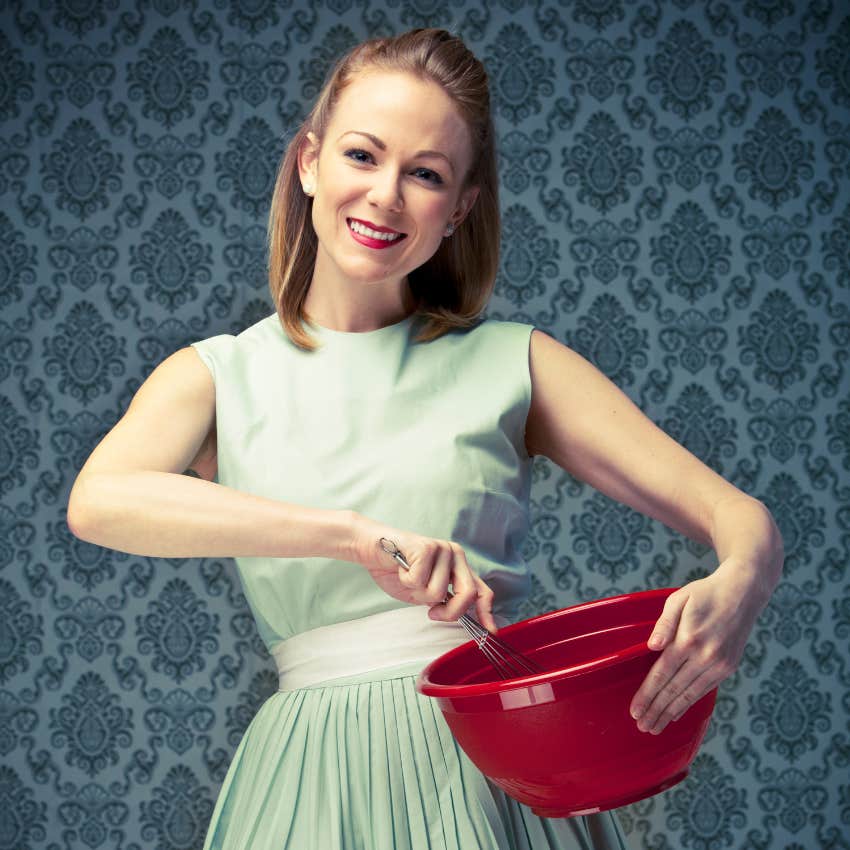Former 'Tradwife' Explains The Stark Difference Between That Lifestyle And Being A Stay-At-Home Mom
The difference is hidden behind a glamorous facade.
 Da Antipina, Stock-Asso / Shutterstock
Da Antipina, Stock-Asso / Shutterstock As the tradwife trend becomes ever more popular, many former tradwives are coming forward to share the often shocking details all those glamorous social media videos leave out.
TikToker Enitza Templeton is one of them.
Templeton explained the stark difference between a tradwife and a stay-at-home mom.
Despite many people's perceptions, the overwhelming majority of trad wife influencers have adopted their lifestyle for explicitly religious reasons.
Many are Evangelical Christians, and a seeming majority are members of the Church of Jesus Christ of Latter-Day Saints, both faith traditions that extol the virtues of traditional, submissive, and often repressive gender roles for women.
Many of the most outspoken tradwives, like influencer Estee Williams, are open about these motivations and speak about them in explicitly religious and political terms that often sound a lot like propaganda.
But many other tradwife influencers, like current sensation Nara Smith, are so adept at hiding this part of the lifestyle that many online are left thinking that "tradwife" must just be a hip new word for "stay-at-home-mom."
But Templeton knows the distinctions between the two firsthand. She was a tradwife until her husband's intimacy demands forced her to question what exactly she had signed up for, and she's since become something of an authority on the subject.
Templeton explained that being a stay-at-home mom is a choice, while 'tradwives' are 'trapped' by supposedly God-dictated gender roles.
Templeton said the two arrangements could not be more starkly different. "A tradwife is [expletive] trapped," she said, and that tradwives and their husbands are living "traditional gender roles," they think are "assigned from the Lord God himself."
This, she explained, puts impossibly high stakes on these women. "When you don't cook that dinner, you're not just disappointing your family, you're letting down your God," she explained.
This is, of course, entirely different from being a stay-at-home mom — a woman who, in most cases, has chosen a life of domesticity for specific reasons. And if she is being pushed into it, it's typically because of economic forces like the costs of childcare, not a supposed Biblical imperative being enforced by her husband. By contrast, Templeton said, "A tradwife is a… slave by design from your Lord and Savior."
That might sound bombastic, but that is pretty much exactly how most vocal former tradwives online characterize the relationship. Nearly all describe a common theme of religiously enforced repression if not outright abuse.
The very name 'tradwife' refers to these old, 'traditional' and supposedly Christian values for women.
In a follow-up video, Templeton had one simple answer for stay-at-home moms who think the term "tradwife" describes their chosen dedication to domesticity: "You're wrong."
"Being a 'tradwife' means returning to traditional roles," Templeton explained, "traditional times, traditional life, traditional gender roles." It's right there in the name, after all.
But for most people in this movement, it goes far beyond just being the "little woman" in the kitchen, barefoot and pregnant.
"Your husband is the only one with the trained ear to hear what the Lord is telling him, and so your husband has authority over you," Templeton explained. "So you are letting down [God, your husband, and your family] when you are not upholding your role as a traditional woman and wife."
I know from experience that the 'tradwife' dynamics Templeton described are true, and I've seen firsthand the damage it can do to women and girls.
Here is where, in the interest of "journalistic integrity," I will disclose that I myself was raised in Evangelical Christianity and was groomed to be precisely the type of "tradhusband" that Templeton described.
What she is saying may sound absurd to the uninitiated casually scrolling TikTok and Instagram, but it is a very real phenomenon among many right-wing, Christian people, and it is either implicitly or explicitly a part of nearly every tradwife's online content.
The reason many of the most clever "tradwife" influencers, like Smith, don't reference these dynamics in their videos is because they know that obscuring it will have precisely the impact it has had.
 Photo: inhauscreative / Canva Pro
Photo: inhauscreative / Canva Pro
Many women watching, especially moms, will see their content as harmless, glamorous, and something to aspire to. That equals more clicks on their content, which equals more money. It's that simple.
It's also related to a wider effort among the political right and religious conservatives to rebrand and launder right-wing and religious extremism by appealing to women directly — and making women the vanguard of their movements, in fact.
There's nothing wrong with choosing to be a stay-at-home mom, of course. There's nothing wrong with choosing a life of domesticity and tradition, either. But the keyword there is "choosing."
The belief systems underpinning the tradwife trend have nothing to do with choice and everything to do with dogmatic rules about what women are and are not allowed to be and do, enforced unilaterally by the men in their lives. Don't let all the glamorous — and extremely lucrative — TikToks fool you.
John Sundholm is a news and entertainment writer who covers pop culture, social justice, and human interest topics.

